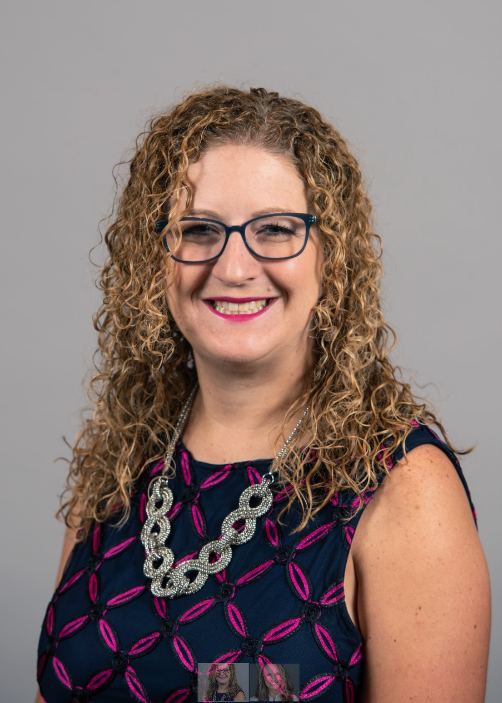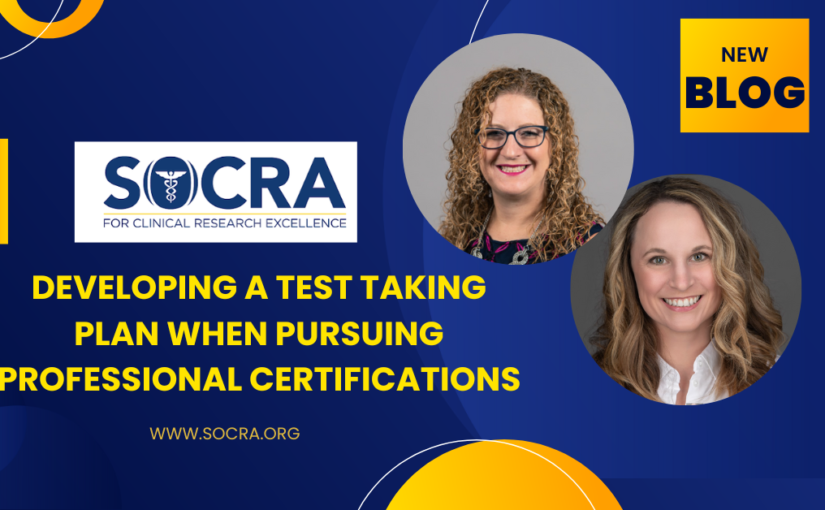
Laura R. Holtz
MS, PMP, CCRP

Jessica Rowe
MA, MS, CCRP, CIP
People pursue certifications for various reasons. Some pursue certification for professional credibility or recognition, while others aim to meet position requirements for job opportunities. “Certification demonstrates your commitment to superior professionalism, to upholding industry standards, and for continued learning (www.mbopartners.com).” Regardless of the motivation, all test takers want to be successful. In our respective roles, we are often approached by research professionals with questions about certification and about taking a certification exam. We rely on our backgrounds to construct a reply. Laura Holtz has a background as a teacher and as a project manager. She relies on her experience in those roles to provide guidance regarding certification. Jessica Rowe has a background in academia and in instructing adult students enrolled in graduate courses. She calls upon that experience to provide tips and tools for successfully pursuing professional certification. Of course, both authors rely on their own experiences pursuing their certifications when answering related questions.
Seeking a professional certification is a huge undertaking and is an investment in time, energy, resources, but ultimately an investment in oneself. It is important to ask yourself, “Why do I seek to obtain this certification?” and, “How will this certification help me meet my goals?” Answers to these questions can be used as motivators when the studying gets tough, and will serve to remind you to keep pushing forward.
What is your best way to learn regulatory and guidance material?
Let’s say that you have registered for the SOCRA CCRP certification exam. Congratulations! But often, the mountain of information to be reviewed can seem terrifying. You must equip yourself with the tools to help you successfully climb that mountain. First, it’s best to determine how you learn. There are options for self study, with the reference materials provided, or some may choose to participate in a SOCRA Certification Preparation and GCP Review Course that is offered periodically both virtually and in person.
When reviewing the materials, consider setting some goals before you begin. By setting goals, you will be able to evaluate your progress. Small achievements and wins will keep you motivated and will hopefully contribute to your overall success.
- One idea of a goal is to be able to state back to yourself, in your own words, the concept, research regulation, or ethical principle that you are studying. Even though Teach-Back techniques were often developed to assess health literacy they can be used here, too. Teach-Back strategies can help form open-ended questions to use when assessing understanding of key concepts.
- For each Code of Federal Regulations part, section, concept or form, try to restate the idea in a 2-3 word phase that is easier to remember. Make a note in the margins so you don’t have to do the mental gymnastics to try to figure your short cut out again later.
- Consider creating a timeline of historical events in clinical research. This will help you put the directives, regulations, and guidelines into context.
Do you remember pulling those all-nighters cramming for finals; you don’t need to do that again. Set a realistic timeline for your review process, with identified milestones. Maintaining motivation while studying can pose a major barrier. Using a calendar, mark your study topics down for specific dates. This will allow you to fit studying in with competing priorities. Focus on smaller chunks of information that will turn those daunting mountains into manageable molehills. Use positive reinforcement for hitting milestones, perhaps rewarding yourself with your favorite treat!
Do you have a study plan?
Now, for some practical suggestions on how to study. Prepare yourself, this next tip is a big one. Go through the reference materials in their entirety, COVER TO COVER, at least three times. Yep, THREE times! (Adapted from Rita Tips on Passing the Exam)
The first read, you are going to read the materials contained in the SOCRA Certification Reference Manual in order to identify key concepts and ideas. This read is the “contact sports” read. This is the read where you will ask yourself to explain the concepts in your own words (i.e., Teach-Back). It will be where you write the 2-3 word note in the margins of the paper or electronic document. This is when you can take additional notes, create flashcards, or highlight sections of the materials. During this read, leave no stone unturned, even if you feel confident that you already know the material. The first read will usually take you the longest of the reading passes, so you may want to consider that when setting up your studying timeline.
The second read is where you start building your own mountain from the many stones. You will be looking to understand the relationship between individual concepts from each section and how they relate. Laura refers to this read as the “flippy book” and it’s a great technique to start relating concepts. You will be flipping back and forth through the study materials looking at one key concept to connect related dots together. For example, you may start to recognize the similarities and differences between the roles of the Sponsor and the Investigator. Or, you may look at the Code of Federal Regulations (CFR) and Good Clinical Practice (ICH GCP) guidance on informed consent and recognize how GCP guides compliance with the CFR.
On the final reading, start again at the very beginning and read from cover to cover. Your goal for this reading is to synthesize the material, knit it together and repeat key
concepts. It will also give you an opportunity to identify and review items that you may have missed or forgotten. This is where you will want to focus on the concepts you find the most challenging.
As you develop your study/review plan, consider your learning style. If you have a “read/write” learning style, you may learn best by reading and taking copious notes. If you are more of an auditory learner, you may retain material best by reading aloud to yourself. For more information on learning styles and approaches visit: 8 Types of Learning Styles – University of the Potomac.
Almost there, do you have a plan for taking the exam?
You have prepared to take the test and you feel that you know the material. It is time for your flawless execution. But wait, do you have a plan for taking the CCRP exam?
You will have a few different options for test taking. Computer based testing (CBT) is available at over 600 testing centers around the world. “At home” or “Remote” computer based testing is available for a candidate’s additional convenience. Group testing (in-person) is available on a limited basis and needs to be coordinated through an organization or institution that will accommodate a minimum of twenty-five registered and approved candidates. Computer based testing technologies will allow a candidate to “flag” a test item for later review or reassessment.
Here are some hints and suggestions:
- You have 4 hours to complete the exam. First, go through and answer ALL of the questions in 90-120 minutes. Begin by first reading the test question. Then read the situation that is given. This will allow you to focus on the information you are looking for and to disregard any additional details/scenarios that are not relevant. If you are taking a test that includes a test question booklet, you can strike through any answer choices that you know are wrong, so you don’t look at them again. Questions will have answers that all might seem like good options, so look for the best answer. There will, however, be only one correct answer. If you are unsure of the correct choice, “flag” (circle) the question number in your test question booklet or “flag” it electronically if you are taking a computer based test. You will come back to those flagged questions later.
- At the 2-hour mark, give yourself a brief mental break. Close your eyes and give your hands a rest. Reset yourself for the next part of the exam. Measured breathing or brief meditation can help to reduce test anxiety and stress. Remind yourself, “You work in clinical research every day. You’ve got this!”
- For a scan-tron (paper and pencil) type exam, start the second half of the exam time with a little quality check. Select 5 to 8 questions throughout the exam. Check that the answer you selected is in the correct corresponding number on the answer sheet. You are looking to make sure that your numbering did not get out of order at some point. If you think your numbering is out of order, start rechecking your work to find where it got out of the correct sequence. You have 2 hours left to correct such errors.
- When revisiting test questions, remember that during the first 2 hours, you reviewed every question, but of some you were not so sure. These were the questions that you circled or flagged for later review. Now is that time for “later review.” Reread the test question and the complete scenario with fresh eyes. Consider whether there might have been similar questions in other parts of the exam that can give you a hint. Look them up and apply their logic to this question; but know that exams are structured to eliminate any such relationships. Then, revisit all answer choices, even if you initially crossed any out or if you flagged the question. Again, try to limit yourself to the top 2 answer choices. If you still do not know the answer, just leave it and move on. Your first guess is usually the best one; don’t overthink it. Wrong answers are simply not counted into your final total of correct answers; you are not otherwise penalized by wrong answers.
- Try to resist the urge to go back and “retake” the exam when you are checking your work. Do not revisit questions you did not flag no matter how tempting it may be to do so. Redoing the test may cause you to become flustered or anxious. These are not the most ideal circumstances to do your best work. Trust your answers and trust yourself.
- Finally, remember the exam is testing your knowledge of the regulations. Do not be derailed by your site procedures or you own organization’s policies which may have additional requirements outside of the FDA regulations or the ICH guideline.
You should not underestimate the power of personal confidence and of trusting yourself. When entering your test, you can have confidence in your preparations and test taking strategy. “Low opinion of one’s self leads to making undesirable choices and to poor performance. Having confidence in your abilities will lead to better decision making and better performance. Self-confidence depends on the following variable: Correct interpretation and control of the situation.” (See: Sport Psychology: Self-Confidence & Resilience). Jessica and Laura hope you will feel more in control of your situation with a solid test taking plan, that you will be able to meet your “why,” and ultimately be successful in passing your exam.
Disclaimer: This post is for educational purposes and for your consideration only, and all suggestions are the opinions of the authors. The authors cannot guarantee successful completion of any exam, but we do hope that our suggestions are helpful to you.

What do you mean by reference materials? I went to the 2 day review course. I also have 2 SoCRA books, 4 th edition. Is this enough?
Are there any practice tests? I found one but would like some more that ask questions in the same manner as the SoCRA test I took.
Please advise.